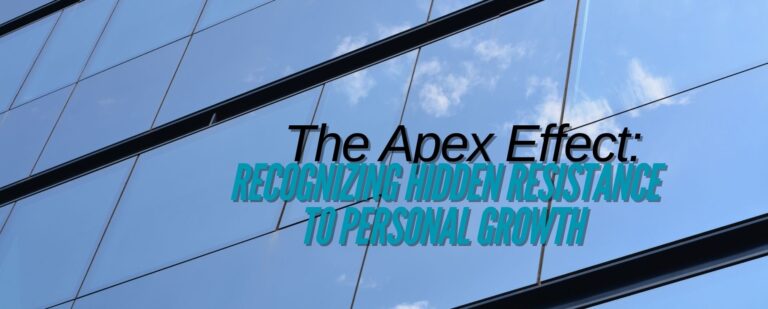Has this ever happened to you? You’ve poured time and energy into a meaningful journey of self-improvement. You’ve confronted challenges, engaged in workshops, even invested in coaching. At first, you notice small, subtle changes—a lighter mood, reduced stress, and a stronger sense of focus. But oddly, you find yourself feeling as though you were born with all those self-regulating skill sets and you doubt your past self ever needed support or guidance to that desired transformation, thinking “ Did I really need that much help, or did I simply “snap out of it” on my own?” Well, if it has, I want to share with you that this intriguing phenomena is known as the Apex Effect, a psychological quirk that can distort our memory of the very steps we’ve taken toward improvement.
The Apex Effect isn’t just something that happens in personal lives; it can crop up in professional environments as well. For leaders, understanding this effect could be the key to fostering an atmosphere where progress is acknowledged and resilience genuinely grows. It can be challenging to advocate for investing in services that are effective and extremely helpful in activating expansion, growth, and progress when human beings can often be caught up in the Apex Effect.
What is the Apex Effect?
The Apex Effect, a term coined by Dr. Roger Callahan in the context of Thought Field Therapy (TFT) and other therapeutic practices, describes the tendency to minimize or even dismiss the impact of deep personal work once healing has occurred. When people experience a sense of resolution, they often forget or underplay the method that got them there. This isn’t intentional; rather, it’s a curious trait of the mind. Once an issue is resolved, the brain can quickly “rewrite” the process, sometimes attributing progress to random factors, like a “I just needed one good day to cure my lifetime of anxiety” or a cheerful workspace, rather than recognizing the hard work involved.
Leaders and individuals working in high-stakes environments may face this mental shortcut as they strive to cultivate resilience. Imagine a veteran executive who begins practicing mindfulness exercises or engages in hypnotherapy to heal an emotional trauma. As their sense of well-being returns, the memory of their initial struggles can fade, along with appreciation for the practices that helped them. This detachment from process undermines a core aspect of emotional resilience: the conscious acknowledgment of personal growth.
Why Does the Apex Effect Happen?
The mind is wired to normalize our state once it reaches equilibrium, adapting quickly to improvements and focusing on present stability. This adaptive trait has evolutionary roots—by default, our brains aren’t focused on cataloging past emotional struggles but on maintaining balance.
For someone undergoing therapy, leadership coaching, or stress-management training, the Apex Effect may appear as a belief that they didn’t really need help after all. They might say, “I just worked through it myself,” disregarding weeks or months of guided effort. In an organizational setting, employees may similarly downplay training, forgetting that strategic support facilitated their achievements. All of this can lead to a real severe case of disacknowledgement with such services and supports and their tremendous value in personal and organizational growth.
The Cost of Ignoring the Apex Effect
In personal development and leadership, neglecting the Apex Effect can result in several consequences:
- Underappreciating Proven Methods: By not crediting the practices that facilitated healing or growth, people may abandon valuable tools that could benefit them in the future.
- Impact on Team Morale: In the workplace, if leaders don’t recognize the journey of development, they risk fostering a culture where progress and resilience are expected but rarely acknowledged. Employees may feel undervalued or under-supported, seeing their hard work go unrecognized.
- Reduced Investment in Emotional Resilience: Resilience requires consistency, awareness, and reinforcement. By minimizing the role of these qualities in improvement, leaders may neglect continuous practices that could prevent burnout or stress in the future.
How to Recognize and Address the Apex Effect in the Workplace
Identifying the Apex Effect isn’t about attributing everything to formal techniques or therapies, but rather about staying conscious of how growth and healing happen. Here’s how to start recognizing it, in yourself and in your organization:
- Celebrate Incremental Wins: Acknowledging small successes helps reinforce the memory of each step in the journey. (Don’t worry, it is possible to keep the memory of where you’ve been without the emotional track that was keeping you stuck in a rut to begin with!) In personal development, this might look like tracking changes in stress levels or mood; in the workplace, it might involve recognizing moments of team resilience during challenging projects.
- Track Progress: Keeping records of personal growth can help leaders and teams see how far they’ve come. For instance, journaling or recording team reflections can show shifts in emotional or mental state over time. Revisiting these records helps reinforce the value of the journey.
- Encourage Mindful Acknowledgment: Within teams, encourage conversations that highlight the learning and growth each member has experienced. By intentionally discussing processes rather than just outcomes, leaders can create a culture of acknowledgment and continuous learning.
- Build a Resilient Feedback Loop: When the brain “rewrites” progress, it’s easy to overlook the tools that got us there. Establish feedback mechanisms where team members or leaders can reflect on what has helped them during challenging times. Regular check-ins can create a habit of attributing resilience to consistent effort rather than dismissing it as “just feeling better.”
Acknowledge the Journey, Sustain the Growth
The Apex Effect may lead us to believe that we have grown on our own, discounting the techniques or people who helped us along the way. For leaders, awareness of this phenomenon can become a powerful asset, enabling us to maintain and strengthen resilience within ourselves and our teams. As you continue on your own development path, remember: growth isn’t magic; it’s built one step at a time. Let’s honor each step of that journey, for ourselves and those around us.




